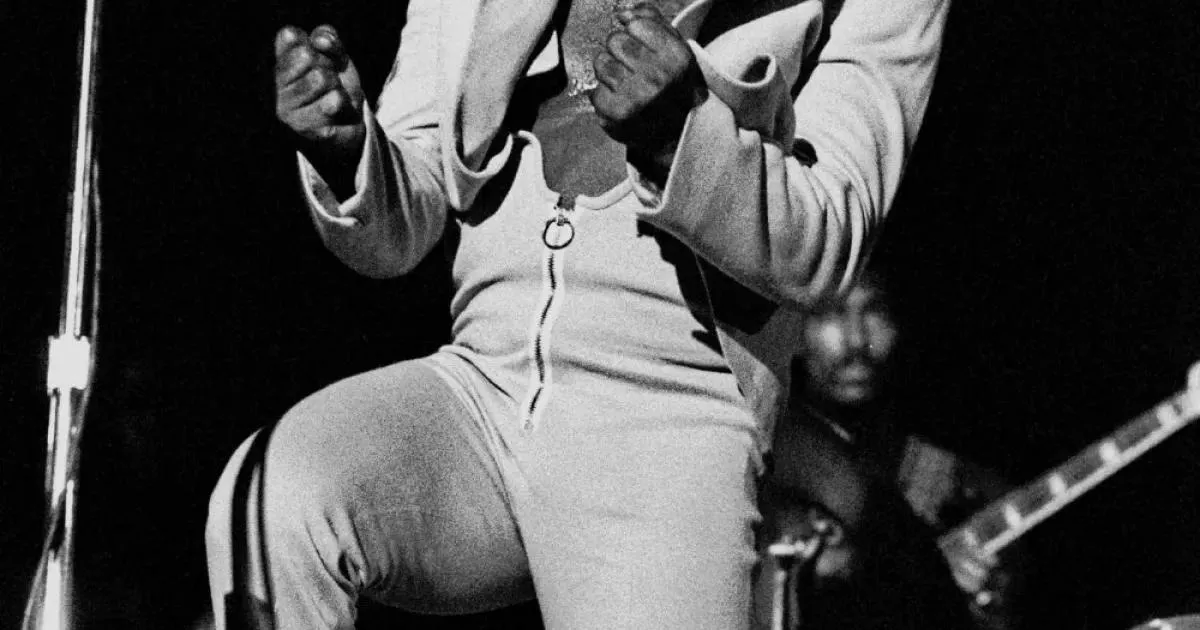A closer look at the defining struggles that shaped James Brown's life and career.
James Brown, an iconic American singer, songwriter, dancer, and musician, is widely regarded as the "Godfather of Soul" and the central progenitor of funk music. Known for his energetic performances and relentless work ethic, he earned nicknames like "Mr. Dynamite" and "the Hardest-Working Man in Show Business." His influential career spanned over five decades, shaping the development of various music genres. Brown was among the first inductees into the Rock and Roll Hall of Fame in 1986, and his music has been extensively sampled, highlighting his enduring impact on music and popular culture.
1933: The Brown family lived in poverty in Elko, South Carolina
In 1933, the Brown family lived in poverty in Elko, South Carolina, which was an impoverished town.
June 14, 1952: Paroled from prison
On June 14, 1952, Brown was paroled and went on to work with both of Lawson's sons, and came back to visit the family from time to time throughout his career. Shortly after being paroled he joined the gospel group the Ever-Ready Gospel Singers, featuring Byrd's sister Sarah.
1962: Tammi Terrell Joins James Brown Revue
In 1962, Tammi Terrell joined the James Brown Revue. Brown became sexually involved with the 17 year old Terrell and physically abused her during their relationship.
1963: Incident at Club 15
In 1963, during a concert at Club 15 in Macon, Georgia, James Brown, reportedly wielding two shotguns, allegedly tried to shoot his musical rival Joe Tex, leading to multiple people being shot and stabbed.
1970: Tammi Terrell's Death
In 1970, Tammi Terrell, who was James Brown's girlfriend before becoming famous as Marvin Gaye's singing partner in the mid-1960s, died. Her departure from Brown was attributed to her desire to escape his physical abuse.
1971: Firing of J.B.'s Members
In 1971, James Brown fired Catfish and Bootsy Collins, members of the J.B.'s, after suspecting they were using drugs during a performance. The members intentionally took LSD during the show, violating Brown's drug-free policy.
November 1972: Boycott and Protests in Cincinnati
In November 1972, James Brown's endorsement of Nixon's campaign during the 1972 presidential election negatively impacted his career during that period with several national Black organizations boycotting his records and protesting at his concert shows; a November 1972 show in Cincinnati was picketed with signs saying, "James Brown: Nixon's Clown".
January 1973: Withdrawal from Youth Concert
In January 1973, James Brown was initially invited to perform at a Youth Concert following Nixon's inauguration but bailed out due to the backlash he suffered from supporting Nixon. Brown blamed it on "fatigue".
1974: Separation from Deedee Jenkins
In 1974, James Brown and Deedee Jenkins separated after years of domestic abuse.
July 16, 1978: Arrest After Apollo Performance
On July 16, 1978, James Brown was arrested after performing at the Apollo for reportedly failing to turn in records from one of his radio stations after the station was forced to file for bankruptcy.
1982: Alleged Regular PCP Use
By the mid-1980s, it was widely alleged that James Brown was using drugs, with Vicki Anderson confirming that Brown's regular use of PCP began before 1982.
1983: Paternity Suit
In 1983, James Brown pleaded no contest to a paternity suit brought against him regarding Michael Deon Brown, though he never officially acknowledged Michael as his son.
1984: Drug Use with Adrienne Rodriguez
In 1984, after marrying Adrienne Rodriguez, she and James Brown began using PCP together.
1987: Arrest for Assault Against Adrienne Rodriguez
In 1987, James Brown was arrested on charges of assault against his third wife, Adrienne Rodriguez.
January 1988: Facing Criminal Charges
By January 1988, James Brown faced four criminal charges within a 12-month span relating to driving, PCP, and gun possession.
April 3, 1988: Arrest for Assault
On April 3, 1988, James Brown was arrested for assault.
April 1988: Arrest and CNN Interview
After an April 1988 arrest for domestic abuse, James Brown went on the CNN program Sonia Live in L.A. with host Sonia Friedman. The interview became notorious for Brown's irreverent demeanor, with some asserting that Brown was high.
May 1988: Arrest on Drug and Weapons Charges
In May 1988, James Brown was arrested on drug and weapons charges.
September 24, 1988: Arrest Following High-Speed Chase
On September 24, 1988, James Brown was arrested following a high-speed car chase on Interstate 20 near the Georgia–South Carolina state border.
1988: Rodriguez Files for Divorce
In 1988, Adrienne Rodriguez filed for divorce from James Brown citing years of cruel treatment. They later reconciled.
1988: Alleged Rape by Jacque Hollander
In January 2005, a woman named Jacque Hollander filed a lawsuit against James Brown, which stemmed from an alleged 1988 rape. Hollander alleged that the incident took place in South Carolina while she was employed by Brown as a publicist.
February 27, 1991: Parole Release
On February 27, 1991, James Brown was released on parole after serving two years of a six-year prison sentence for carrying an unlicensed pistol, assaulting a police officer, and various drug-related and driving offenses.
1994: Lisa Rushton's Allegations
Between 1994 and 1999, former background singer Lisa Rushton alleged that James Brown demanded sexual favors, cut off her pay, and kept her offstage when refused. She claimed Brown touched her inappropriately and restricted her interactions with other men.
October 1995: Rodriguez Hospitalized After Assault
In October 1995, Adrienne Rodriguez was hospitalized after another assault by James Brown, during which he allegedly beat her with an iron pipe and shot at her car.
January 1996: Charges Dropped After Rodriguez's Death
In January 1996, charges against James Brown related to the assault on Adrienne Rodriguez were dropped after her death.
January 1998: Rehab and Arrest
In January 1998, James Brown spent a week in rehab to deal with an addiction to unspecified prescription drugs and was arrested a week after his release for unlawful use of a handgun and possession of cannabis.
1998: Mary Simons' Accusations
In 1998, Mary Simons accused James Brown in a civil suit of holding her captive for three days, demanding oral sex, and firing a gun in his office, though the charge was eventually dismissed.
1999: Rushton Withdraws Lawsuit
In 1999, Lisa Rushton withdrew her lawsuit against James Brown.
July 3, 2000: Incident with Electric Company Repairman
On July 3, 2000, police were summoned to James Brown's residence after he was accused of charging at an electric company repairman with a steak knife.
2002: Hollander's Claims Dismissed
When the case was initially heard before a judge in 2002, Hollander's claims against James Brown were dismissed by the court as the limitations period for filing the suit had expired.
January 2004: Arrest for Domestic Violence
In January 2004, James Brown was arrested in South Carolina on a domestic violence charge after Tomi Rae Hynie accused him of pushing her to the floor during an argument, causing scratches and bruises.
January 2005: Jacque Hollander Filed Lawsuit
In January 2005, Jacque Hollander filed a lawsuit against James Brown, which stemmed from an alleged 1988 rape.
December 2006: Traces of Cocaine Found
Prior to his death in December 2006, traces of cocaine were found in James Brown's urine when he entered Emory University Hospital.
2007: FBI File Released
In 2007, James Brown's FBI file was released to The Washington Post under the Freedom of Information Act, related Brown's claim that the high-speed chase did not occur as claimed by the police, and that local police shot at his car several times during an incident of police harassment, and assaulted him after his arrest.
Mentioned in this timeline

Chris Brown is a highly successful American singer songwriter rapper...

Michael Joseph Jackson the King of Pop was a highly...

Martin Luther King Jr was a pivotal leader in the...

John F Kennedy JFK was the th U S President...

Jackie Chan born Fang Shilong is a highly influential Hong...
Nigeria is a West African nation the most populous in...
Trending

57 minutes ago Christa Miller shares Scrubs revival update, Jordan's reveal in new production.

57 minutes ago Kristi Noem Testifies at Senate Hearing on DHS Shutdown and Immigration

58 minutes ago Scott Speedman as R.J. Decker and Best Medicine are featured on March 3, 2026.

2 hours ago Rachel Weisz Explores Steamy Fantasies in Netflix's 'Vladimir' Series Featuring Leo Woodall.

2 hours ago Zack Snyder reveals why Christian Bale's Batman didn't appear in BvS and DCEU.
2 hours ago Kevin Warsh's potential impact on Federal Reserve policies and rate cut outlook.
Popular

Jesse Jackson is an American civil rights activist politician and...

Hillary Diane Rodham Clinton is a prominent American politician lawyer...

Jim Carrey is a Canadian-American actor and comedian celebrated for...

XXXTentacion born Jahseh Dwayne Ricardo Onfroy was a controversial yet...

Michael Joseph Jackson the King of Pop was a highly...

Bill Clinton served as the nd U S President from...
